
Feb 17, 2023 | Events
Insight from the event: “How to engineer great governance for better outcomes”, which marked the launch of the ICE’s Infrastructure Governance Code on the 25th of January 2023.
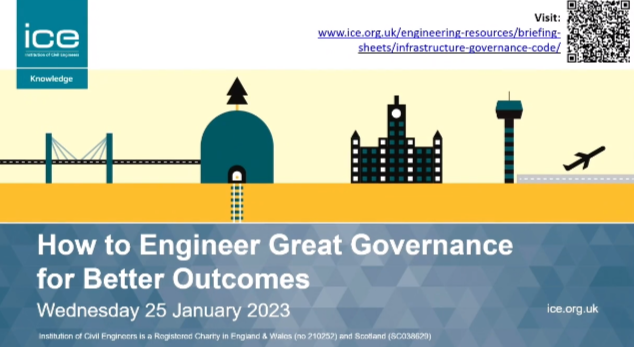
The code itself very clearly describes the context into which it is launched: the complexity of delivering major infrastructure projects and programmes is more than can be solved by traditional approaches. As an industry, we are faced with the need to change our ways of working to be able to effectively address the critical challenges of our time. The code is embedded in Project 13’s governance pillar and presents an opportunity to again bring attention to the enterprise model, and a better means of organising projects to deliver outcomes.
“This Code provides a structured system of good practice and challenge that creates the right environment to support effective decision-making.” – The Infrastructure Governance Code
The structure of the code provides a ready-made framework for organisations and project teams looking to organise themselves in the manner of Project 13. Below we explore a few reflections on some of the themes discussed at the launch event.
Front-end loading
Reiterating the message of his blog ‘Setting up for success: The importance of Front-End loading’, Nick Smallwood highlighted the importance of investing time and resource early on in a project to plan effectively and review the desired approach, before diving into delivery. This continues to be a key theme across industry best practice, recently highlighted in the Construction Playbook. During the event, Dr Simon Addyman also noted that there are many well-documented case studies in which the benefits of front-end loading to achieve the project or programme outcomes are clearly demonstrated. The question then remains, why is it difficult, at the initiation stage of so many projects and programmes, to resist the urge to rush into delivery?
We often talk about the need for diverse thinking within our teams. For me, this is another situation where we must recognise that the lack of diversity in skills across our teams is damaging our ability to deliver the best outcomes. If major project teams are over-represented at the initiation stage by those who are enthusiastic about delivery, they can overwhelm the voices of those who would spend more time developing ideas, designing and testing solutions, and assessing and reassessing whether the plans we have put together will take us to where we want to go!
Front-end loading is, in many ways, about getting the appropriate balance of these skills at each stage of the project lifecycle. This happens through creating the right environment and setting up the team, decision-making and governance processes. All with the outcome of the project at the centre.
Professional responsibility to do our best
David Porter, Vice President of the ICE reminded us of the mission of the institution, and the call to civil engineering professionals to always do their best for society. This commitment and belief in the importance of the role that civil engineering and infrastructure delivery play in society is often a strong driver for the move towards zero carbon and more sustainable use of materials, but what could it have to do with governance?
The persistent feature of all our infrastructure challenges, whether economic, environmental, social or otherwise, appears to be increasing complexity. Instead of a single problem, where a traditional approach to finding one solution would suffice, we are now trying to solve a much more interlinked set of problems that are constantly changing. Our response must therefore reflect the complexity, meaning that we must have both resilience and flexibility in our ways of working – including governance – so that it doesn’t simply break under the strain of change.
The inclusion of behaviours and accountabilities in the code is vital in acknowledging this need for resilience and flexibility. Much of what is needed is less about incremental improvement, and more about a change in approach, which as we have seen from the changes in safety culture in construction, is highly dependent on behaviours and accountabilities. The principles very clearly set requirements for the social competence of the governing body, to be able to make effective decisions in a complex, dynamic environment. It sets the expectation that, much like the technical and commercial elements, the social competency of leaders is not left to chance; expectations are articulated, and the right individuals are sought out, supported, and developed. Sue Kershaw shared an example of a board of directors who engaged an independent coach and expressed the value that they gained from having someone who was able to provide objective reflection, enable self-evaluation and help the group understand the effective and ineffective ways in which they were working together. This is the essence of our approach to working with project teams – sitting on the edge of the team, board, or leadership group where it is possible to be fully committed to the project outcome while having enough independence from the internal systems to provide valuable insight into them.
The governance code, along with the rest of the Project 13 ethos and maturity model, provides the industry with a framework to safely challenge the way that things have always been done in order to deliver better outcomes for the benefit of society, now and in the future.
You can download a copy of the new governance code here, or catch up on the presentations from the launch event on the ICE website.
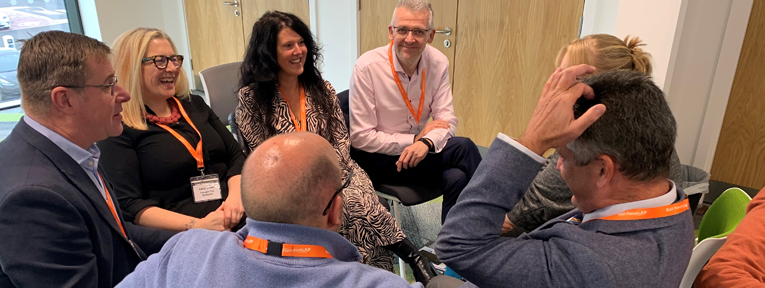
Nov 8, 2022 | Events
Rail Forum event – Infrastructure Collaboration: A Route to Success
Last week, we had the opportunity to join the Rail Forum as an event partner and keynote speaker for their Infrastructure Collaboration: A Route to Success event. Around 80 delegates gathered together at the RaisE Business Centre in Goole to hear from industry experts to unpick collaboration, what it means for the supply chain and how it can work well in practice. Ben Higgens, Engagement Manager at the Rail Forum opened the floor explaining that in order for collaboration to work, it needs to be a win-win for all parties.
“Given how important collaboration is and will continue to be moving forward in the industry, we are keen that it does not become another buzzword. By providing an opportunity for our members to hear best practice case studies, key considerations for when looking to collaborate, and also a legal perspective, they are better placed to collaborate effectively”. – Ben Higgens, Engagement Manager at Rail Forum
Keynote: Creating a collaborative project environment to drive performance
ResoLex has been working for the last 20 years to embed collaborative environments in large infrastructure projects to achieve better project outcomes. We were therefore delighted to share our industry experience as the keynote speaker at the event. Our Chief Executive, Edward Moore started the session with a bang… well technically with a question! “Collaboration is the answer but what is the question?”
He pointed out that with just the 80 attendees there were 6320 potential connections in the room. If one thinks of some of the major projects with thousands of people in the supply chain, there are millions of potential connections! The greater the number of connections, the greater complexity involved in managing that project through to successful completion. Ed went on to look at the difference between transactional, cooperative and collaborative relationships and how to determine which approach is best for your project and whether collaboration is the right answer.
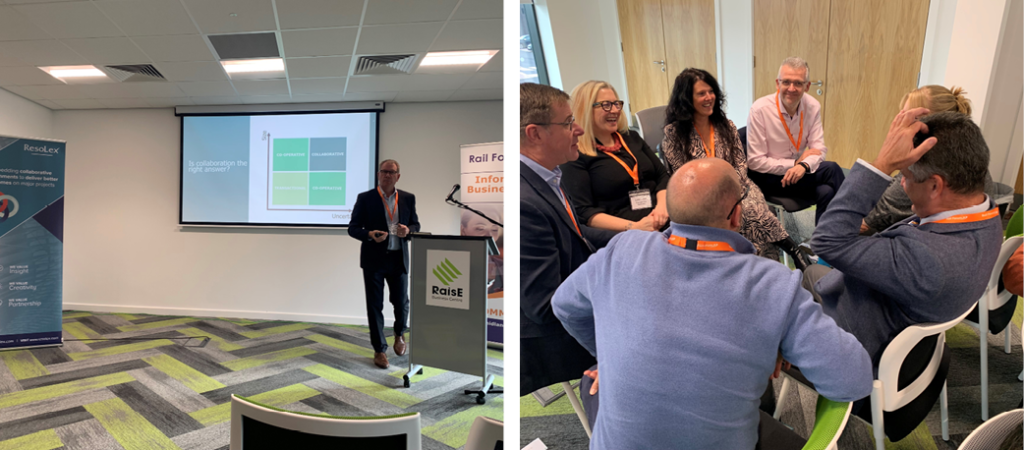
He then delved into what collaboration may bring including; enhanced benefits realisation, time-saving and an enhanced outcome, moving on to how one can create purposeful relationships and the attributes of a collaborative relationship.
“Let’s think about the most effective relationships we want and if the answer is collaborative then let’s not go in light-heartedly. Let’s do it with the right investment, and the right commitment and then what we can create is a connected ecosystem that allows the value to be drawn from all of the supply chain. The alignment, the sharing of knowledge between the client with their external drivers and their project objectives, right the way through so that everyone is part of an aligned supply chain that are all working to that one goal. Then I think we will start to see a real upshift in project performance and the value can be created.” – Edward Moore, CEO at ResoLex
Guest speaker summary
Speakers including Mark Smith from TAZIER, John Allsop from VAN ELLE, Jake Rudham from Unipart Rail and Graham Shaw from Volker Rail each explained the importance of collaborative relationships and environments on their projects. The key takeaways included the alignment of objectives within the partnership and understanding the scope of responsibilities. Drawing on the importance of business relationships, developing personal relationships with like-minded individuals within the businesses was also mentioned.
Mike Halliday, Network Rail Eastern expressed the need for behavioural change to understand the supply chain a little better. He also highlighted the importance of identifying risks early within a project and taking an approach that puts the project first. Many project leaders and professionals understand the need to identify risks but often miss or put less effort into identifying behavioural risks. ResoLex has developed a number of tools to use in complex environments to help identify these risks, you can find out more on our website here.
Emma Toes, Nelsons solicitors mentioned the considerations you should have and the legal boundaries in place for a successful collaborative relationship. She highlighted the need for a contract to protect your business, project and relationship.
To finish the session, Ben posed the question: What is one word to describe collaboration? With answers from the guest speakers including:
• Trust
• Alignment
• Reliability
• Pride
We’d like to thank those at the Rail Forum for their continued support and the opportunity to be a partner and keynote speaker at such an insightful event. We hope the importance of collaborative environments rings true for many working on major projects and in complex environments. If you think we could be of assistance to support your team, please get in touch.
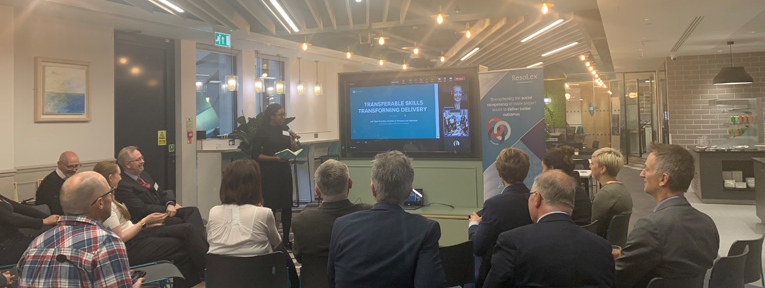
Nov 7, 2022 | Events, Roundtables
With guest speaker Rose McArthur, Director of Transport and Highways for Cheshire West and Chester Council and facilitated by Kelachi Amadi-Echendu, ResoLex
Kelachi opened the session with some background on ResoLex, explaining one of our underlying observations; projects rely on a triumvirate of competencies, technical, commercial and social. To set the landscape further, she highlighted a general challenge for lack of skills within the infrastructure sector. The skills problems begins at a high-level, so we have a technical challenge in areas such as climate change, as well as the economic challenges that organisations are wrestling with in a post-pandemic environment. The social component of major projects mentioned earlier encompasses these leadership challenges. The theme of the session was therefore to consider how we can bring people-oriented skills into the industry from other sectors whilst still appreciating the technical skills with career developments that aren’t necessarily leadership.
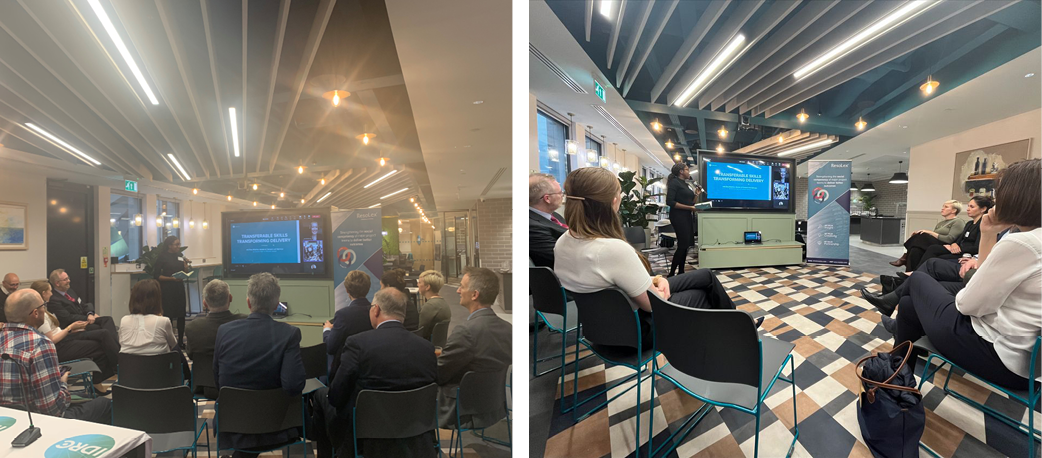
Rose started her presentation by talking about her own journey from being a Senior Consultant in a large engineering company, to a very different role in a local authority. Her background in integrated transport planning gave her the opportunity to work on huge projects such as the 2012 London Olympics, keeping people moving despite the challenge with an influx of people.
In her new role, she now has to focus on the practical problems within the highway sector exemplified by issues such as potholes, gulleys and pigeons. Many of the problems are much smaller in scale but there are huge amounts of them. Although Rose has a Director role and needs to strategically plan for the council’s transport and highways, many public enquiries are escalated to her due to a lack of communication from the project level and out to the local community.
Cheshire highways are a £5 billion asset, so there are many miles of road infrastructure that must be managed within very tight financial constraints. Rose made the point however that her biggest challenge is actually the people – as is the case in many engineering-focused teams, the historic basis for promotion is time served and technical expertise. Little concern has ever been paid to the skills of being customer focused and focusing strategically on future needs. All too often teams within the organisation have a silo mindset, and it is therefore difficult to get them to engage in new concepts outside of their core areas of expertise. So when it comes to management skills, technical competency is probably only around 25% of what is needed. Instead, there is a critical need for skills in communication, people management, delivering change, and the ability to engage a wider stakeholder group. Of course, some people with these technical skills may thrive in leadership and management roles but only with the right effort put into training – these important skills need development and training.
In developing her teams, Rose has found that she must therefore expand her search horizons when looking for new recruits. For example, she believes that change starts with the data-led approach, so the ability to analyse and communicate trends and issues is critical. She is also seeking people who have effective communication skills so that stakeholder relationships can be managed more effectively. More often than not, she has to go outside of the organisation to look for people in other sectors and industries to get the less technical but more strategic types of people to therefore reach the balanced team she requires.
Thoughts and observations from the floor included the following:
- An example was given of the huge value provided by somebody who had a passion for the environment but who originally came from a role in finance.
- Bringing in new skills and perspectives is important, but to be successful organisations need to be ready for the disruption they may cause. For example, construction firms are often not comfortable with people who are trying to push a different way of thinking.
- Leadership is critical in changing mindsets and behaviours. An example was given from a major programme where one of the senior leaders attended the sustainability group which significantly boosted attendance and output.
- There is a distinct leadership skill set around managing complexity and ambiguity.
- Creating resilient teams is one of the keys to survival in the 21st century, where leaders surround themselves with people who support each other in pursuit of a common goal.
The underlying message from the session is that in organisations that need to change, there needs to be a shift in the types of skills and competencies that may not be present in the current structure. The technical element which used to be dominant in many engineering-oriented businesses are still important, but at leadership, the level must often be subordinated to the ability to manage the problems created by complexity, scale and pressure on resources. The challenge for all organisations involved in infrastructure is to identify the different skills needed and create an environment which will encourage bright people to come and join them.

Oct 25, 2022 | Events
Event partner and Keynote speaker at the Rail Forum’s Infrastructure Collaboration event
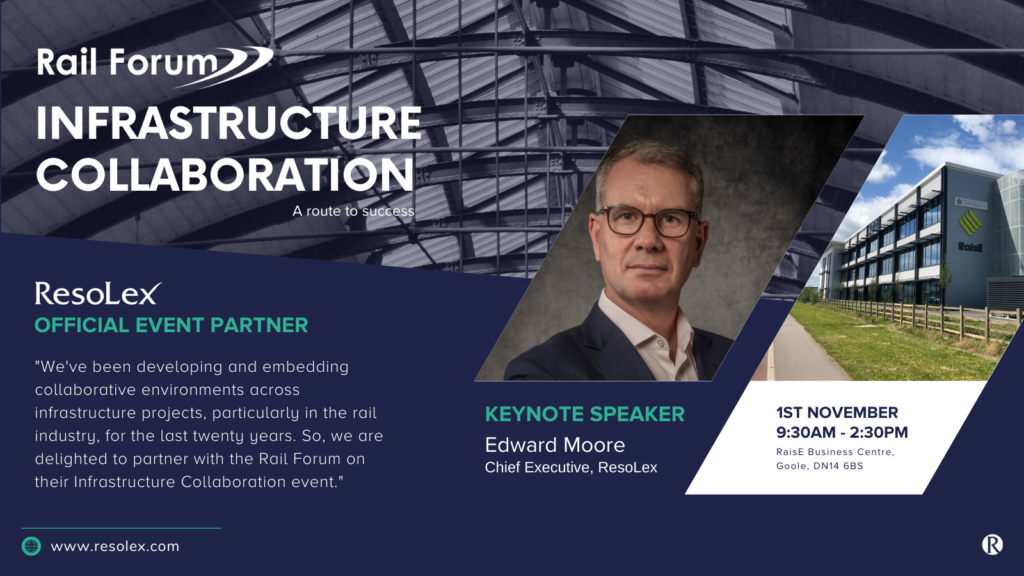
Collaboration is a major buzzword in project delivery – and reasonably so, as more people recognise that it’s a key component of success. The challenge for many of us, is what does it look like in practice?
At ResoLex, we embed collaborative environments to deliver better outcomes on major projects. Our approach helps teams and project leaders manage the complexity of large-scale projects using a combination of behavioural theory, technology and industry experience to co-create new solutions to old problems.
The Rail Forum‘s ‘Infrastructure Collaboration – A Route to Success’ event aims to explore what collaboration means, and what it might look like in the rail infrastructure environment. With a topic so close to our hearts, we’re super excited to be an event partner and are delighted to share our experience and the industry insight we’ve built over the last 20 years with you all.
If you’re thinking of coming, we’d be delighted to see you! If you haven’t registered yet, you can use the link below:
https://www.railforum.uk/events/infrastructure-collaboration-a-route-to-success/
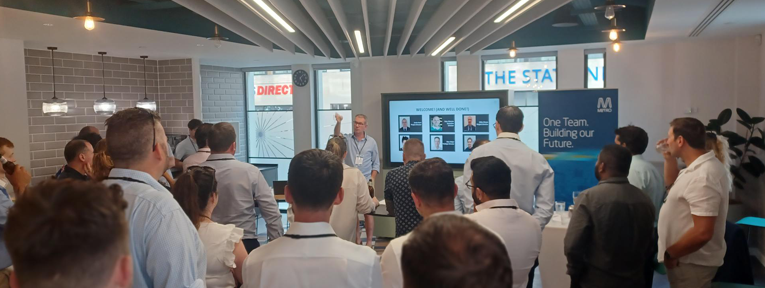
Jul 29, 2022 | Events
Last week, the team from Metro Trains Melbourne (MTM) travelled 10,497 miles and we couldn’t wait to welcome them to our new offices for an amazing networking event! All the way from their offices near St Patrick’s Cathedral, Melbourne to ResoLex HQ by St Paul’s Cathedral, London.
MTM are on a mission to recruit some amazing new talent to relocate and join them on some exciting projects in Victoria. Planning an event so far away can be difficult so we joined forces with Rail Media and NAWIC (National Association of Women in Construction) to help plan and execute the perfect networking and recruitment event.
Why did we become an event partner?
“Having worked with several of the MTM leadership team members in the UK, we were keen to support their international learning opportunities and foster international collaboration.
We joined MTM as their event partner as we know major projects worldwide require the same key elements to ensure success; technical competence, commercial competence and what we term social competence. Metro Trains Melbourne are offering the opportunity for project professionals to share learning from Crossrail and HS2 (High Speed 2) to this exciting urban transport project ‘Victoria’s Big Build’.
We are particularly interested in the impact of the alliance agreement, preferred in Australia when it comes to creating the integration required for successfully deploying the rail systems.
Therefore we were delighted to meet Pete Gleeson, Executive Director, and catch up with Jamie Burns and Lisa Hogben when they said they were coming to the UK on a learning mission and support their offering of opportunities to those who fancy the adventure of relocating to work with Metro”.
Edward Moore, Chief Exec. at ResoLex
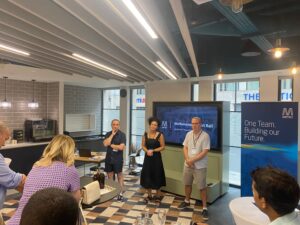
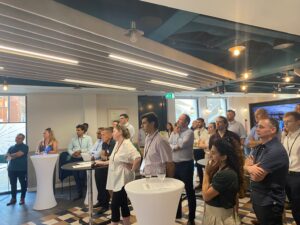
The event was a great success for MTM and those interested in relocating! We are keen to support like-minded organisations in major projects who are working to build diverse and collaborative teams. We caught up with Lisa Hogben, Package Director at Metro Trains Melbourne for some feedback on the event and here’s what she had to say:
Having worked with ResoLex in the past, enjoyed their innovative and creative professional development events and seeing how they live their values of insight, creativity, and partnership, I knew they were the right partners for our UK networking event.
To me, the essence of true collaboration is doing things for others even if there’s no immediate benefit to you, and ResoLex models that essence.
We’re so thankful that ResoLex agreed to be our event partners, and we definitely owe them one!
We would like to thank everyone involved and wish those relocating every success in an industry close to our hearts! Get in touch if you would like to see how we can help your project team.
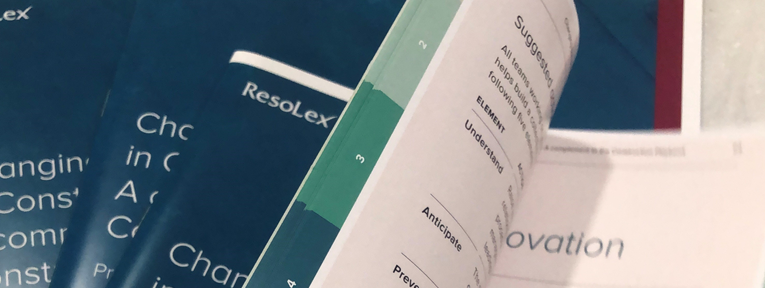
Jul 12, 2022 | Events, Roundtables
Putting The Construction Playbook into Practice – 30th June 2022
Facilitated by Ed Moore and Kelachi Amadi-Echendu
ResoLex’s Roundtable series recommenced with our first in-person session since Autumn 2019 and in our new home – you may have seen, we have relocated along with our friends from the International Dispute Resolution Centre to Paternoster Lane right next to the beautiful St. Paul’s Cathedral – where we welcomed a select group to delve into some of the key aspects of The Construction Playbook.
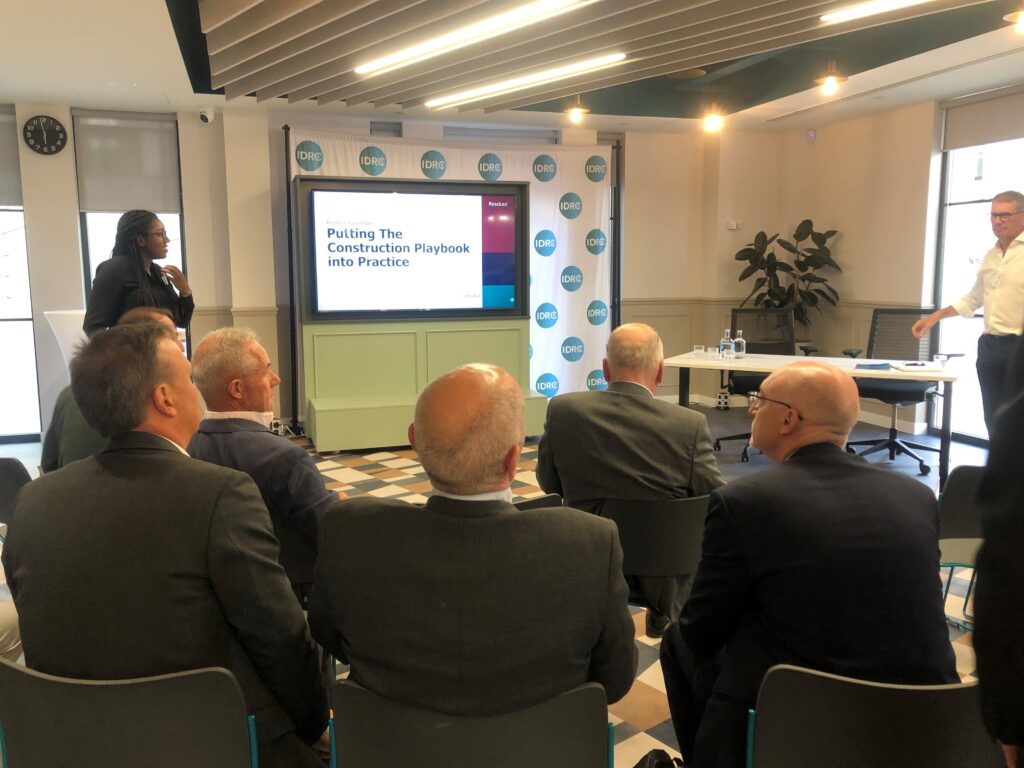
Our Chief Exec, Ed opened the session by setting out our view that the success of major projects hinges on three critical interlinked elements; Technical, Commercial and Social. His observation is that The Construction Playbook continues the worthy objective of modernising the construction industry. However, reading through the document one can see that its focus is primarily on a project’s technical and commercial elements, but has little to say on the social element, on the people that deliver projects.
Our Senior Consultant, Kelachi then introduced the report we recently produced, Changing Behaviours in Construction: A complement to The Construction Playbook. The report brings together our experience and contributions from our Associates and is designed to act as a complement to The Construction Playbook. It provides practical guidance on the behavioural and cultural elements that supplement some of the key recommendations in the Playbook, focusing on actions and activities that we know through our experience help to build a project’s ‘social capital’.
Our Roundtable sessions are designed to be an interactive discussions rather than a lecture. We, therefore, had an interactive session with participation from everyone in the room, offering a range of perspectives around two key topics:
- Collaborative Leadership
Leadership has been a hot topic within the industry lately. Kelachi pointed out that it is discussed throughout our report and was recently raised in the second iteration of the ICE review: A Systems Approach to Infrastructure Delivery. An article in the NCE references the report as identifying the need for projects to move on from the habit of appointing ‘hero leaders’ – you can find the full article here.
There was consensus in the room that when faced with complexity, there is a need to adopt different leadership styles and attributes and, that collaborative leadership is desirable, but it is probably more important to embed the right culture at the start. The discussion also brought out the recognition that the leadership needs of a project change as the project/programme moves through the cycle. In modern construction, leaders need to be truly agile, and able to adjust their approach depending on circumstances.
- Front End Loading
Ed picked up on the requirement in the Playbook to put more time into the start of a project to think through how a team will work together before moving into the task of construction. The question to the room was the extent to which this would add value.
The consensus was that time spent working through potential issues with the full design and delivery team, ideally producing a digital twin, would ultimately produce a better outcome. The proviso, however, was that project teams need to be clear on the main focus, as time can easily be frittered away on inconsequential matters.
The other challenge identified is that upfront investment in building relationships could be wasted if individuals involved in the early stages of a project then quickly moved on to other projects or roles. The answer to this problem was seen to be the need to proactively establish a strong culture so that new entrants to the project would quickly pick up the required mindset and behaviours set out in the beginning.
Summary
Taking an overview of the evening’s discussion, the common perspective was a recognition that the social, and therefore people component is a key element in the shifting of behaviours to enable the construction industry to deal with the complexity and uncertainty that are features of our current environment. The industry must therefore focus more effort to train leaders in how to become more agile and understand how to build project cultures that will embed collaborative ways of working that will endure through the life cycle of a project.
You can access The Construction Playbook and our report through the links below:
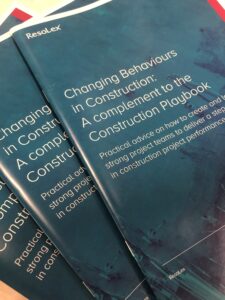
The Construction Playbook
Changing Behaviours in Construction: A complement to The Construction Playbook
Tony Llewellyn – 4 July 2022













